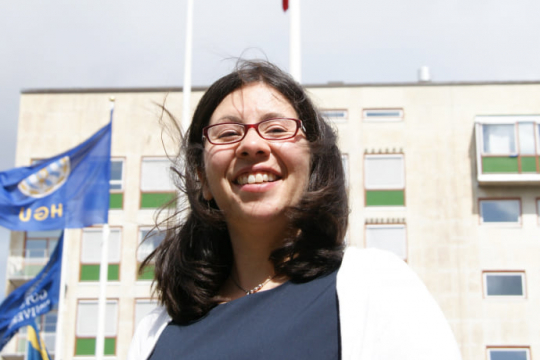The Director of NENRE EfD-Chile, Marcela Jaime, was interviewed on the radio program "Todos Juntos"(All Together in English) by the host Marlene Guerrero regarding two studies: the evaluation of the stove replacement program and the application of air-purifiers in schools. The interview took place on July 24 and here is a summary of the discussion.
The Chilean center has spent the last decade studying different aspects of air pollution and possible solutions for public policies applicable to different parts of the country according to their varied characteristics.
Switch to better heating alternatives
Marcela Jaime first talked about the evaluation of a stove replacement program in the city of Talca (Chile), implemented during 2019 - 2021. The researchers compared the conditions of the households that participated in the program with those that still had fuelwood stoves.
"We found that it is a very effective program to reduce air pollution inside and outside households, but the cost of providing this equipment is very high as well as the number of users. So, the question was how to keep financing the replacement of stoves," Marcela Jaime said.
Other alternatives were also evaluated, such as the transition to pellet stoves for heating, and air conditioning for heating or cooling, at affordable prices for low-income households. Marcela Jaime explained that the replacement policy did not have a social focus, so any type of household could apply and participate.
"The recommendation was that policymakers should consider the characteristics of the beneficiaries," she commented.
“While a percentage of homes that replaced their stoves could finance the cost of pellets, there were also other beneficiaries who did receive the stove but were not able to afford pellets.”
Marcela Jaime pointed out that a subsidy for this fuel needs to be considered once the stove has been replaced.
These replacement programs were applied to sectors of the country that have been declared as "saturated areas" with levels of air pollution that exceed those determined by the WHO. According to Marcela Jaime, population density should also be considered in this policy, which means prioritizing areas with the largest number of inhabitants and highest levels of pollution.
Air pollution has effects on school performance
The air quality problem is a global problem that directly affects people's health.
"There are various studies that relate to the prevalence and severity of cardiorespiratory diseases, the exacerbation and deepening of chronic diseases, and even a possible negative effect on the cognitive development of children, which has been related to school performance, absenteeism from classes due to episodes of respiratory diseases, and with neurological disorders,” she said.
"This demonstrates the importance of generating favorable conditions for children and how to clean the air inside schools."
NENRE EfD-Chile is currently working on a pilot project in which air purifiers are delivered to certain schools in the Coronel municipality, in the Biobío Region (Central-Southern Chile). This place was chosen since it exceeds the levels of different kinds of pollution severely, especially air-related, resulting in being classified as vulnerable in relation to environmental hazards.
"These certified air purifiers clean a large percentage of particulate matter (PM) inside classrooms," she explained.
The research team expects to obtain important data in a few more months regarding the potential effects of these air purifiers on the level of school absence, illnesses, school performance, and other features of children. The aim is to convert this initiative into future public policies for other regions of the country.
Marcela Jaime also noted that one important lesson from the pandemic was that the use of masks in public spaces can help reduce the negative effects of particulate matter, and thus reduce the impact on older adults, chronically ill patients, and children who often play in open places.
By Belén Pulgar
